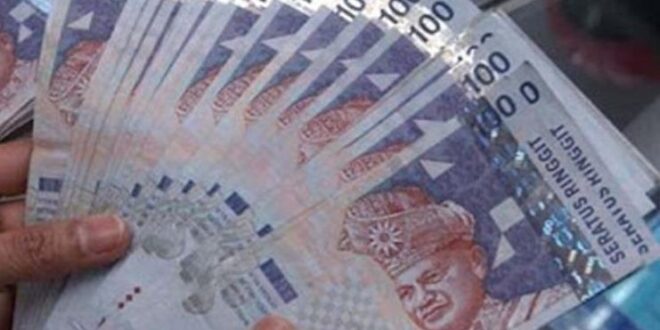KUALA LUMPUR: The ringgit gained some ground against the US dollar at the closing today following a decline in the US Dollar Index (DXY), said an analyst.
At 6 pm, the ringgit improved to 4.7750/7785 against the greenback from last Friday’s closing of 4.7810/7855.
Bank Muamalat Malaysia Bhd chief economist Mohd Afzanizam Abdul Rashid said other regional currencies such as the Indonesian rupiah, Philippine peso, Korean won and the Indian rupee also appreciated against the greenback.
“We believe the market will continue to remain cautious on the US Federal Reserve’s (Fed) hawkish assessment of the US economy.
“Hence, Friday’s US Personal Consumption Expenditures (PCE) numbers which is the favourite inflation gauge by the Fed will be closely monitored,” he told BK.
Elsewhere, Brent crude has remained close to US$90 per barrel despite the uncertainties over the Middle East tension.
“All in all, the foreign exchange markets remain cautious at the current juncture,” said Mohd Afzanizam.
Sharing a similar view, SPI Asset Management managing director Stephen Innes said the key US economic data to be released later this week, particularly the US gross domestic product (GDP) and the core PCE reading, could influence the Fed’s forward guidance.
He said risk markets are hoping for cooler prints, which could also improve the ringgit’s fortunes.
“While interest rate differentials between the US and Malaysia continue to be a significant negative factor for the ringgit, the recent easing of tensions in the Middle East has tempered the demand for safe-haven assets like the US dollar.
“Hence there is a subtle a shift in currency flows as market participants recalibrate their risk assessments in response to changing geopolitical dynamics,” said Innes.
Looking at the macroeconomic landscape, he said the nascent positive shift in the global manufacturing cycle is poised to bolster global growth.
This trend could mitigate the extent of the US dollar strength over the medium term, provided unforeseen risks like escalating tensions in the Middle East do not materialise.
“Finally, local traders will also be closely monitoring any indications of foreign exchange intervention by Japan, especially with the Bank of Japan policy meeting scheduled for later this week.
“Any intervention will likely temporarily boost the ringgit,” Innes added.
The ringgit was also traded higher against a basket of major currencies.
The local unit ticked up vis-a-vis the Japanese yen to 3.0852/0877 from 3.0947/0978 at Friday’s close, appreciated versus the British pound to 5.8938/8981 from 5.9533/9589 and compared with the euro, the ringgit rose to 5.0859/0896 from 5.0961/1009 previously.
It traded mostly higher against ASEAN currencies.
It edged up versus the Thai baht to 12.9044/9198 against 12.9668/9847 at Friday’s close and climbed against the Singapore dollar to 3.5041/5069 from 3.5113/5149.
The ringgit was marginally better versus the Philippine peso to 8.29/8.31 from 8.30/8.32 and remained unchanged vis-a-vis the Indonesian rupiah at 293.9/294.4. – BK
 BeritaKini.biz Berita Viral Terkini di Malaysia
BeritaKini.biz Berita Viral Terkini di Malaysia





